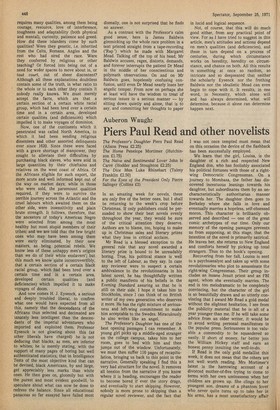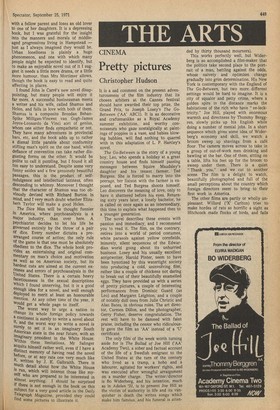Auberon Waugh:
Piers Paul Read and other novelists
The Professor's Daughter Piers Paul Read (Alison Press £2.25) The Home Penelope Mortimer (Hutchinson £1.75) The Naive and Sentimenta/ Lover John le Carre (Hodder and Stoughton £2.25) The Dice Man Luke Rhinehart (Talmy Franklin £2.50) For the Eyes of the President Only Pierre Salinger (Collins £2) In an amazing week for novels, these are only five of the better ones, but I shall be returning to the week's crop before Christmas. If only publishers could be persuaded to show their best novels evenly throughout the year, they would be sure of the critical attention they deserve. Authors are to blame, too, hoping to make up in Christmas sales and literary prizes what they lose in critical acclaim.
Mr Read is a blessed exception to the general rule that any novel awarded a literary prize is bound to be unreadably boring. True, his political stance is well to the left of Labour, as they say. In case any reviewer were to suspect a certain ambivalence to the revolutionaries in his latest novel, he has thoughtfully written a public manifesto •of his beliefs in the Evening Standard assuring us that he is still on their side. I hope it takes him to Stockholm, since I can think of no British writer of my own generation who deserves it more. He has the right mixture of seriousness and left-wing commitment to make him acceptable to the Swedes. Miraculously he also writes like an angel.
The Professor's Daughter has one of the best opening passages I can remember. A young girl picks up a middle-aged stranger on the college campus, takes him to her room, goes to bed with him and then jumps out of the window. Unfortunately, we must then suffer 110 pages of recapitulation, bringing us back to this point in the narrative. Generally speaking I find this a very bad structure for the novel. It removes all tension from the narrative if you know where it is heading, encourages the reader to become bored if ever the story drags, and eventually to start skipping. However, nobody is more prone to skipping than a regular novel reviewer, and the fact that I was not once tempted must mean that on this occasion the device of the flashback has been successfully employed.
We learn that the girl, Louisa, is the daughter of a rich and respected New England don, who has foolishly associated his political fortunes with those of a rightwing Democratic Congressman. On a journey to Mombasa, the father has discovered incestuous leanings towards his daughter, but subordinates them by an uncharacteristically authoritarian manner towards her. The daughter then goes to Berkeley where she falls in love and eventually marries a hopeless, self-obsessed moron. This character is brilliantly observed and described — one of the great comic archetypes of our time. Only our memory of the opening passages prevents us from supposing, at this stage, that the intention of the novel is primarily satirical. He leaves her, she returns to New England and comforts herself by picking up total strangers. Thus to the book's opening.
Recovering from her fall, Louisa is sent to a psychoanalyst and takes up with some revolutionaries who plot to assassinate the right-wing Congressman. Their group includes an insane Jesuit priest and an FBI agent, whom she eventually marries. The end is too melodramatic to be completely convincing, but the character of the girl is so beautifully drawn and so utterly convincing that I award Mr Read a gold medal without the slightest hesitation. I see from the publicity material that he is all of a year younger than me. If he will take some advice from an older writer, it would be to avoid writing personal manifestoes in the popular press. Seriousness is too valuable a commodity to be squandered so easily. If short of money, far better join the William Hickey staff and earn an honest penny insulting the well-to-do.
If Read is the only gold medallist this week, it does not mean that the others are not well worth reading. Mrs Mortimer's latest is the harrowing account of a divorced mother-of-five trying to come to terms with her own uselessness when her children are grown up. She clings to her youngest son, dreams of a phantom lover who never quite turns up to take her in his arms, has a most unsatisfactory affair with a fellow parent and loses an old lover to one of her daughters. It is a depressing book, but I was grateful for the insight into the manners and morals of middleaged progressives living in Hampstead — just as I always imagined they would be. Urban loneliness is plainly a huge phenomenon, and one with which many people might be expected to identify, but to make an enjoyable novel out of it I suggest it needs a little more drama, or a little more humour, than Mrs Mortimer allows, though the book is easy to read and quite affecting in places.
I found John le Carre's new novel disappointing, but many people will enjoy it far more. A successful businessman meets a writer and his wife, called Shamus and Helen, and falls in love with both of them. Shamus is a composite Brendan BehanSpike Milligan-Vincent van Gogh-James Joyce-Leonardo da Vinci sort of genius, Whom one either finds sympathetic or not. They have many adventures in provincial bars, etc, and the book adds up to rather a dismal little parable about conformity stifling man's spirit on the one hand, while defiance of convention can take rather dis gusting forms on the other. It would be Polite to call it puzzling, but I found it all too easy to understand. Despite some very funny asides and a few genuinely beautiful Passages, this is the product of selfindulgence and intellectual laziness, often descending to whimsy. Moreover I thought that the character of Shamus was too obviously devised with Richard Burton in Mind, and I very much doubt whether Elizabeth Taylor will make a good Helen.
The Dice Man will be thought funnier In America, where psychoanalysis is a major industry, than over here. A Psychiatrist decides to let his life be governed entirely by the throw of a pair Of dice. Every number dictates a pre arranged course of action; the only rule Of the game is that one must be absolutely Obedient to the dice. The whole book pro vides an entertaining and original commentary on man's choice and motivation as well as on American society, but its hardest cuts are aimed at the current excesses and errors of psychoanalysis in the United States. There is a certain heavy facetiousness in the sexual descriptions Which I found unnerving, but it is a good enough idea for a novel, and well enough deployed to merit at least an honourable Mention. At any other time of the year, it would get a whole page to itself. The worst way to urge a nation to Change its whole foreign policy towards a. continent is surely to write a novel about it, and the worst way to write a novel is surely to set it in an imaginary South American state in the near future, with an imaginary president in the White House. Within these limitations, Mr Sslinger acquits himself rather well, even if I have a distinct memory of having read the novel before, or at any rate one very much like it, written by J. K. Galbraith. There is much detail about how the White House is run, which will interest those like my self who are prepared to be interested in almost anything. I should be surprised if there is not enough in the book on this subject for a very good article in the Daily Telegraph Magazine, provided they could find some pictures to illustrate it.



































 Previous page
Previous page